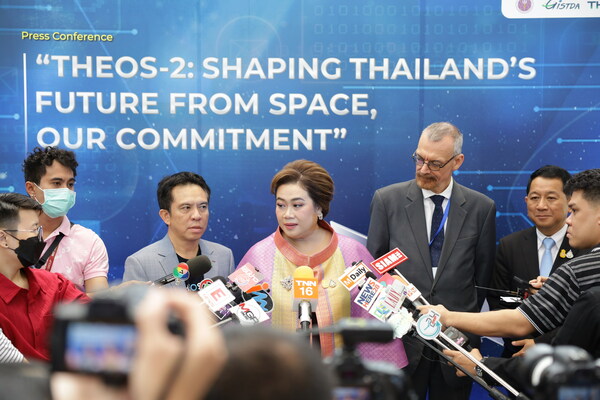BANGKOK, Sept. 27, 2023 /PRNewswire/ -- On September 27, 2023, Ms. Supamas Issarapakdi, the Minister of the Ministry of Higher Education, Science, Research, and Innovation (MHESI), Dr. Pakorn Apaphant, Director of the Geo- Informatics and Space Technology Development Agency (GISTDA), Mr. Rémi Longépé, Charge d'Affaires a.i. of the French Embassy in Thailand, and Mr. Olivier Chartier from Airbus, held a press conference to announce the readiness of the THEOS-2 satellite before its launch into space. The event was titled "THEOS-2: Shaping Thailand's Future from Space, Our Commitment" and took place at Pearl Bangkok on Phaholyothin Road, Bangkok.

Thailand to Launch THEOS-2 into Space on October 7th! A Detailed Earth Observation Satellite, the First of Its Kind for the Country
Thailand's Earth observation satellite, THEOS-2, is scheduled to launch into space on Saturday, October 7, 2023, at 8:36 AM (Indochina time) from the Guiana Space Center in South America. This satellite is renowned for its high-resolution capabilities and marks the first of its kind for Thailand.
Ms. Supamas Issarapakdi, the Minister of the Ministry of Higher Education, Science, Research, and Innovation (MHESI), stated that THEOS-2 is an Earth observation satellite, one of two satellites under the Development of Satellite Systems for Development project, operated by the Geo-Informatics and Space Technology Development Agency (GISTDA), a state-owned organization. THEOS-2 is capable of capturing high-resolution color images at a level of detail down to 50 centimeters. It can capture images and transmit data back to the ground station at a rate of no less than 74,000 square kilometers per day.
The data from this satellite will be used to update information across all areas of Thailand, ensuring that the information is current, detailed, and accurate. This data will aid in efficient emergency response and crisis management, including applications in agriculture, water management, disaster management, urban planning, and natural resource management. Furthermore, it will contribute to the development and enhancement of Thailand's space technology infrastructure, especially in human resources and space industry development, which is crucial for the country's economic growth.
For THEOS-2 data, GISTDA will open opportunities for both the public sector, private sector, and educational institutions to access the data for further development or commercial services. This initiative aims to promote the development of the country's economy and drive education, research, and innovation in spatial data and space technology, fostering innovation at all levels, from youth to startups, SMEs, and large private companies. This aligns with GISTDA's policy of focusing on creating human resources, knowledge, and innovation to develop the country.
Ms. Supamas also emphasized that the launch of THEOS-2 is a historic event for Thailand's future. It signifies a leap forward in the country's development using advanced technology. As the representative of the government and the Thai people who will benefit greatly from this momentous milestone, she attaches great importance to the success of launching this highly detailed Earth observation satellite into space. She invited all Thai citizens to support the GISTDA team and Thailand in this endeavor. The launch of THEOS-2 is a significant milestone as it marks Thailand's first launch of a high-resolution Earth observation satellite.
Once THEOS-2 satellite is launched into space, it will take approximately 5-7 days to adjust itself to its actual orbit. Following that, there will be a testing period of approximately 6 months before it becomes operational. THEOS-2 satellite will play a crucial role in enhancing Thailand's capabilities in space technology and geospatial information. The Ministry responsible for space affairs will expedite the country's space economy policy to become a reality.
Dr. Pakorn Apaphant, the Director of GISTDA, emphasized that THEOS-2 satellite will be an essential tool for the government to manage the country, particularly in improving the quality of life for its citizens. Additionally, it will boost Thailand's competitiveness in space technology and geospatial information.
Using data from THEOS-2 satellite for the development of the country can have various dimensions, including:
Dr. Pakorn emphasized that the launch of THEOS-2 satellite is a practical mission for Thailand's future. This satellite will be employed to address ongoing economic challenges, with the economy being the backbone of the nation. It will play a significant role in fostering sustainable development in various dimensions, both spatially and in terms of improving the economy. GISTDA, as a department under the Ministry responsible for space affairs, is ready to support and promote the use of data from this satellite to address problems in spatial and developmental aspects of Thailand's future.